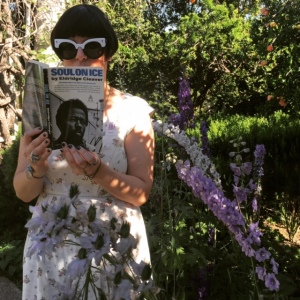
Soul on Ice is comprised of different writings—essays, letters, and musings by Eldridge Cleaver, a former Black Panther Ministry of Information party leader. He writes about who he was, what he did, and why. He does not hide anything: his past actions, his past anger, his past crimes. He also writes about who he becomes, and from Folsom Prison he writes about being 18 years old in 1954, the “crucial turning point in the history of the Afro-American—for the U.S.A. as a whole—the year segregation was outlawed by the U.S. Supreme Court” (Cleaver, 3), which was when he started serving a sentence for possession of pot. This decision shaped what it was like “to be black in white America.” (Cleaver, 3)
Cleaver was born into and lived in a segregated world and didn’t question it. Once segregation was made illegal*, he realizes the world he was in, writing “Prior to 1954, we lived in an atmosphere of novocain. Negroes found it necessary, in order to maintain whatever sanity they could, to remain somewhat aloft and detached from ‘the problem.’ We accepted indignities and the mechanics of the apparatus of oppression without reacting by sitting-in or holding mass demonstrations.” (Cleaver, 4-5) Most of the African American writers I have read either grew up before segregation ended or after.
He writes that “America has been a schizophrenic nation. It’s two conflicting images of itself were never reconciled, because never before has the survival of its most cherished myths made a reconciliation mandatory.” It was only when segregation was abolished that white America had to learn to share space with black America. And this, as Cleaver notes, allowed black people to become angry. This was when people were able to acknowledge those feelings some had kept ignoring.
What is incredibly frustrating about Cleaver’s writing, is that it’s still relevant. He wrote over 1/2 a century ago and he was pissed off (rightly so) and demanded change. I wish he sounded dated. I wish his anger sounded unnecessary. But his words, his rhetoric could be written today. Right now, especially, we are talking about whether black lives matter or all lives matter. Yes, all lives should matter, however, historically and currently, that is not the case. And so the Black Lives Matter movement seeks to rectify this problem. Cleaver wrote “The racist conscience of America is such that murder does not register as murder, really, unless the victim is white.” (73) Cleaver wrote that sentence over 50 years ago. How is that still accurate? We see that time and again, played out by white terrorists with automatic rifles being safely captured in police custody while unarmed black youth are shot in the back**.
I read to learn and understand more. I’m me, my story is my own, and so unless I seek out other stories, my world would be very insular. A goth girl who grew up in middle class suburbia with a dark skinned mom from Spain through Mexico and a white dad. A girl who can’t claim to be “of color” because technically she’s not, but who’s also quite proud of her family’s heritage. I have friends that have been arrested, but none that have been to jail. I don’t know any prisoners. And Cleaver’s writing opened up a lot for me. I read this book last year but it’s stuck with me. It was hard to write about because Cleaver was a challenging person. He committed some crimes that I have problems with, but later regrets his actions. I initially picked up this book to read because I wanted to learn about this history of the Black Panther movement. This book is not about the history of the Black Panthers, but it’s a great book, one that I’m glad I read. Cleaver a wonderful writer, an amazing critic, and gave me another part of American history.
* which, let’s face it, may be “illegal” or “broken-down” but we still see segregation happening through city planning, paperwork, bank loans, etc. (I plan to read Making the Second Ghetto)
**in the language used by journalists, these white American men are seldom noted as terrorists, but they are the very definition of terrorists.
Love it! BLACK LIVES MATTER.
realistic, worthy information on segregated world of black